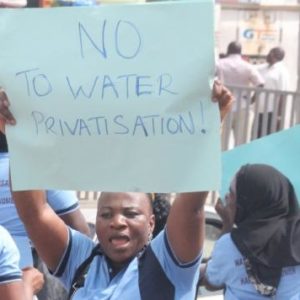Photo Credit: Environmental Rights Action Nigeria (ERA).
Around the globe, one in four people does not have enough safe water to drink. Girls can’t go to school because they spend their days fetching water. Children are dying from waterborne illnesses. Families barely scraping by have to shell out a chunk of their monthly income to buy water of dubious safety.
But it doesn’t have to be this way. We know how to address the water crisis. Public water systems improve public health and provide economic opportunity. But increasingly, the human right to water is being threatened as corporations look to profit from our most basic need. And the World Bank is backing and bankrolling this rush towards water privatization. When corporations take over water systems, all too often the results include rate hikes, shut-offs, or even major water quality issues like lead contamination.
High-level government officials and World Bank executives are gathering in Washington, D.C. this weekend for the World Bank’s big fall meetings. These meetings are an opportunity for the World Bank to promote itself and polish its public image. So executives certainly won’t want to talk about how the World Bank’s investment in water privatization is leading to dire consequences the world over.
During the World Bank’s last major public meeting, U.S. Representative Gwen Moore sent a letter to the World Bank, demanding that it suspend its funding of water privatization. Her letter spurred action around the world. People affected by the World Bank’s water policies — in Nigeria, India, Indonesia, and 55 other countries — sent their own messages directly to the World Bank’s board of directors. They want the World Bank to stop backing water privatization and, instead, to help ensure their human right to water.
Pressure from thousands of people like you is having an impact on the World Bank. In Lagos, Nigeria, the World Bank abandoned its push for a private water contract because you helped make it politically toxic, alongside activists in Lagos. And the World Bank was forced to respond to Representative Moore at the highest levels. Despite these promising steps, the World Bank is dragging its feet in making substantive changes when it comes to its water projects.
We need to let World Bank leaders know we aren’t going anywhere until they stop investing in water corporations. When you make this call, you will be part of a powerful, multi-channel action. Volunteers and organizers are at the meetings right now, talking to World Bank staffers, holding visibility actions in front of the World Bank building, and making sure the voices of people around the world are heard.







